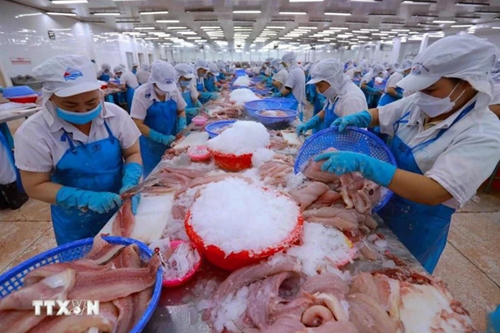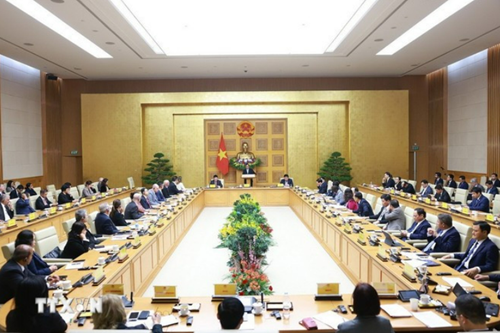Prompt, pro-active actions being taken
Since April 3, right after U.S. President Donald Trump’s announcement, Party and State leaders have engaged in various meetings, working sessions, and phone calls to discuss and find solutions to remove the tariff barriers imposed by the U.S. government, and ensure the harmonization of interests for both sides.
On April 3 morning, the Cabinet convened an urgent meeting to assess the situation and the impacts of the new tariff policy, and to propose solutions to adapt to the situation. Minister of Industry and Trade Nguyen Hong Dien sent a diplomatic note to the U.S. Trade Representative, calling for the postponement of the imposition to allow constructive dialogue to seek a solution acceptable for both sides. Dien also urged a phone call at the earliest opportunity to discuss and address the issue.
    |
 |
|
Processing aquatic products for exports |
A task force on strengthening cooperation and proactively adapting to the adjustments in the U.S. economic and trade policies, led by Deputy Prime Minister Bui Thanh Son, was also established on the same day.
In a meeting with businesses exporting products to the U.S., relevant associations, and agencies on April 4, Deputy Prime Minister Ho Duc Phoc listened to valuable proposals aimed at solving difficulties and obstacles faced by exporters, promoting the implementation of US-invested projects in Vietnam, and adjusting certain tariff rates on imports from the U.S.
At night the same day, General Secretary of the Communist Party of Vietnam Central Committee To Lam held phone talks with U.S. President Donald Trump, during which he affirmed that Vietnam is ready to negotiate with the U.S. to reduce import tax to 0% for goods imported from the U.S., and proposed the U.S. apply a similar rate to products imported from Vietnam. He said Vietnam will continue to buy more U.S. goods that Vietnam needs, and encourage and create favorable conditions for U.S. companies to expand investment in the Southeast Asian country.
On April 6, Deputy Prime Minister Bui Thanh Son, head of the newly-established task force, hosted a reception for U.S. Ambassador to Vietnam Marc E. Knapper, during which he shared that General Secretary To Lam had appointed Deputy PM Ho Duc Phoc as a special envoy to pay a working visit to the U.S. to concretize the contents that the two countries' leaders had agreed on during their phone talks. Son also proposed the U.S. President to postpone the deadline for imposing the reciprocal tariff on Vietnamese goods during the negotiations between the two countries.
Vietnam shares the U.S.’ concern about balancing trade between the two countries, Son said, adding that Vietnam regrets that the U.S. decided to impose a very high reciprocal tariff rate of 46% on Vietnamese imports, which affects businesses of both countries and, in particular, millions of Vietnamese people.
He stated that the tariff imposition decision does not match the reality of bilateral economic and trade cooperation, and correctly reflect the spirit of the Vietnam - U.S. Comprehensive Strategic Partnership, while negatively impacting the flourishing bilateral economic and trade ties.
In a phone call with his Malaysian counterpart Anwar Ibrahim on the afternoon of April 6, PM Chinh informed him about Vietnam’s efforts in engaging with the U.S. regarding measures to remove obstacles, promote economic and trade cooperation, and work towards fair and sustainable trade that harmonizes the interests of all parties.
During the regular Government meeting for March and the teleconference between the Government and localities held the same day, the Government leader also mentioned ongoing diplomatic efforts to address the legitimate demands of the U.S. side, based on harmonized interests and shared risks.
Vietnam deserves fair treatment
After his phone call with Vietnam’s top leader, Trump posted on the Truth Social network, sharing that he just had a “very productive call with To Lam, General Secretary of the Communist Party of Vietnam, who told me that Vietnam wants to cut their tariffs down to zero if they are able to make an agreement with the U.S. I thanked him on behalf of our country, and I said I look forward to a meeting in a near future.”
Although Vietnam is not the first country to negotiate with the U.S. over reciprocal tariffs, it is the first for which President Trump shared the outcome of the phone call on his official page.
    |
 |
|
Prime Minister Pham Minh Chinh chairs meeting with representatives from U.S. businesses. |
The nature of the phone call demonstrates the timely and proactive involvement of Vietnam's leaders, while also reflecting the consistent spirit that Vietnam always shows respect and openness in economic diplomacy and in its relationship with the U.S., said Pham Thi Ngoc Thuy, Director of the Office of the Private Economic Development Research Board (Board IV), in an interview with the Vietnam News Agency.
According to Thuy, many countries have been preparing for negotiations, but the fact that Trump posted news of his phone call with the top Vietnamese leader on his personal page is a very special detail, as it shows that in the diplomatic relationship and trade activities between the two countries, there is something unique compared to the general story.
There is still much technical work to be done in the negotiations, but this detail has greatly motivated the business community.
With consistency in economic diplomacy, and a proactive and sincere approach to negotiations, Vietnam hopes that the upcoming negotiations will see significant progress and meet the expectations of the business community, she added.
The urgent and proactive actions of Party and State leaders have sent a message of Vietnam’s goodwill as well as its desire for the negotiations to yield positive results, and contribute to strengthening the Comprehensive Strategic Partnership between the two countries, as affirmed by Deputy PM Phoc that Vietnam has always been proactive, open, and strongly coordinated with the U.S. to negotiate tariffs fairly, combat the issue of goods transshipment, and promote bilateral trade in a mutually beneficial direction.
Not waiting until the U.S. announced its tariff policy, but over the past two months, the Government has proactively and actively addressed trade concerns raised by President Donald Trump’s administration. Party and State leaders, as well as leaders of various ministries and sectors, have engaged in meetings with the U.S., and exchanged views through all political and diplomatic channels. In early March, PM Pham Minh Chinh spent over three hours listening to the opinions of major U.S. corporations and businesses.
On one hand, Vietnam has basically addressed the concerns of the U.S. side, particularly by proactively reducing 23 import tariff lines (many of which have a 0% tariff rate or are lower than those imposed by the U.S. on Vietnam), creating favorable conditions for U.S. enterprises to invest and do business in Vietnam. On the other hand, the country is working hard to promote a balance in bilateral trade through contracts to purchase goods from the U.S. According to Deputy PM Phoc, Vietnam is currently in the process of purchasing 250 Boeing aircraft and some military planes, as well as liquefied natural gas (LNG) worth 6 billion USD, along with many other goods and equipment valued at over 90 billion USD.
Minister of Agriculture and Environment Do Duc Duy also shared that Vietnam has been making great efforts to remove barriers for the import of U.S. agricultural products into Vietnam, such as maize, soybeans, fruits, beef, chicken, and more recently genetically modified products used for animal feed and aquaculture. To date, the U.S. has sent 61 dossiers regarding genetically modified products, of which 60 have been handled by the ministry, and only one is waiting for additional information from the American partner.
Regarding the response to origin fraud and illegal transshipment combat, Deputy Minister of Finance Le Tan Can stated that the ministry has instructed the Department of Customs to strengthen management of export and import activities, improve awareness and effectiveness in enforcing laws on trade defense, origin, customs, and combating the circumvention of trade defense measures.
The recent economic diplomatic efforts of the Government leaders, along with the willingness to collaboration of industry associations and organizations such as the American Chamber of Commerce (AmCham) in Hanoi and the U.S.-ASEAN Business Council (USABC) give Vietnam optimism and confidence about a successful, fair, and harmonious negotiation outcome that benefits both countries – comprehensive strategic partners with 30 years of diplomatic relations.
Dr. Nguyen Si Dung, former Vice Chairman of the National Assembly Office, affirmed that Vietnam has never sought to enrich itself through improper means. It does not manipulate, but is simply doing what every progressive nation does: participating seriously in the global game, using its own labor force. And because of that, Vietnam deserves to be treated fairly.
Source: VNA